![[HorribleSubs] Utakoi - 13 [720p].mkv_snapshot_05.55_[2012.09.25_17.02.07] [HorribleSubs] Utakoi - 13 [720p].mkv_snapshot_05.55_[2012.09.25_17.02.07]](https://lh4.ggpht.com/-_XBkDNkPQbY/UGJUD9-6OlI/AAAAAAAB2xg/z9mZuxsyjJI/HorribleSubs-Utakoi---13-720p.mkv_sn%25255B50%25255D.jpg?imgmax=800) |
![[HorribleSubs] Utakoi - 13 [720p].mkv_snapshot_18.35_[2012.09.25_17.15.56] [HorribleSubs] Utakoi - 13 [720p].mkv_snapshot_18.35_[2012.09.25_17.15.56]](https://lh6.ggpht.com/-JsZgHOFm8Vo/UGJUGvw54GI/AAAAAAAB2xw/N1bipws-eig/HorribleSubs-Utakoi---13-720p.mkv_sn%25255B15%25255D.jpg?imgmax=800) |
![[HorribleSubs] Utakoi - 13 [720p].mkv_snapshot_20.32_[2012.09.25_17.18.06] [HorribleSubs] Utakoi - 13 [720p].mkv_snapshot_20.32_[2012.09.25_17.18.06]](https://lh5.ggpht.com/-YHrcAcy0gZ0/UGJUI033paI/AAAAAAAB2yA/aGTmiHmidZg/HorribleSubs-Utakoi---13-720p.mkv_sn%25255B48%25255D.jpg?imgmax=800) |
Well, it just wouldn’t have felt like Utakoi with a happy ending.
The inherent problem with this episode is pretty self-evident in that it features two very dicey prospects: Kaji Yuuki doing comedy and Kaji Yuuki doing drama. His “comedic” episode introductions have been the weakest part of the series generally speaking, but it was inevitable that after acting as the device to link all of the Ogura poems covered in the series, Fujiwara no Teika would be the subject of an episode himself – he’s considered one of the greatest Waka poets in history in addition to being remembered for his inestimable contributions as an anthologist.
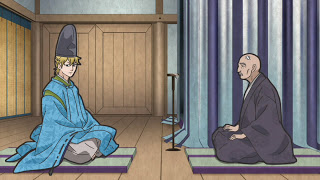 This episode, like so many in this series, is a story of doomed love – two people in love who will never have the chance to be together thanks to the rigid social structure of the Heian era. In this case it’s Teika and Princess Noriko (Ohara Sayaka) known to posterity as Shokushi Naishinno. Teika is introduced as a 19 year-old – a rather immature and selfish brat making the life of his renowned poet father Shunzei (Ogawa Shinji) a living hell. Teika disdains poetry altogether until crossing paths with “outlaw poet” Saigyou (Ogawa Shinji), a kind of late-Heian Jack Kerouac who’s led many young men astray with his rogue poet/monk lifestyle, which at least turns Teika’s head on the subject of poetry itself – if not his father’s.
This episode, like so many in this series, is a story of doomed love – two people in love who will never have the chance to be together thanks to the rigid social structure of the Heian era. In this case it’s Teika and Princess Noriko (Ohara Sayaka) known to posterity as Shokushi Naishinno. Teika is introduced as a 19 year-old – a rather immature and selfish brat making the life of his renowned poet father Shunzei (Ogawa Shinji) a living hell. Teika disdains poetry altogether until crossing paths with “outlaw poet” Saigyou (Ogawa Shinji), a kind of late-Heian Jack Kerouac who’s led many young men astray with his rogue poet/monk lifestyle, which at least turns Teika’s head on the subject of poetry itself – if not his father’s.
We’ve seen this story play out many times over the course of the series – Teika and Noriko are introduced (at her behest, as a favor to Shunzei), and fall in love under the guise of “pretending” to be lovers exchanging poems. Each of the pair has an entry in the Ogura which is interpreted as lament about this doomed romance (hardly surprising, as Teika was the one picking the poems). From the Princess:
Shokushi Naishinno
Tama no o yo
Taenaba taene
NagaraebaShinoburu koto no
Yowari mo zo suru
Like a string of gems
Grown weak, my life will break now;
For if I live on,All I do to hide my love
May at last grow weak and fail.
And from Teika-san:
Fujiwara no Sadaie, Fujiwara no Teika
Konu hito o
Matsuho no ura no
Yunagi niYaku ya moshio no
Mi mo kogare tsutsu
Like the salt sea-weed,
Burning in the evening calm.
On Matsuo’s shore,All my being is aflame,
Awaiting her who does not come
Of course, however broken up he was about his unrequited love for Noriko, Teika recovered well enough to father 27 children by several different women. And of course, to become arguably the most famous anthologist in the Japanese language. His importance goes beyond just the Ogura Hyakunin Isshu and this other poetic anthologies – he was also critical in popularizing The Pillow Book, The Tale of Genji, and other Heian literature, and his influence at court even lingered into the Kamakura Period. The episode itself wasn’t as compelling as some of the other failed romances we’ve witnessed, but I don’t think the series could or should have concluded any other way.
On the whole, I think Utakoi was a successful series. The interpretation of The Hundred Poets has been going on for almost as long as the Ogura has been in existence, and it allows us to project our own imaginations into these brief passages to try and fill in the emotional blanks. That’s all the series is, really – one mangaka’s attempt to bring the Hundred Poets to life. There were distractions – the very low-rent animation, for one, and the sometimes painfully awkward attempts to infuse modern humor into the stories for another. As with any episodic show some episodes or arcs were markedly stronger than others. But where Utakoi succeeds is in showing the timelessness of human emotions, and how little we’ve changed as individuals even as our society itself has been reshaped countless times. There may not be a lot of historical accuracy in some of these stories, but there’s emotional accuracy in most of them – and if they do anything to bring attention to the poems themselves, so much the better. Now – stay tuned for Chihayafuru Season 2 in January, and more of Kana-chan’s interpretations of the works in question.
![[HorribleSubs] Utakoi - 13 [720p].mkv_snapshot_05.38_[2012.09.25_17.01.50] [HorribleSubs] Utakoi - 13 [720p].mkv_snapshot_05.38_[2012.09.25_17.01.50]](https://lh3.ggpht.com/-JvrY5lK7_io/UGJULs46PfI/AAAAAAAB2yQ/tJcKk4d9IDA/HorribleSubs-Utakoi---13-720p.mkv_sn%25255B52%25255D.jpg?imgmax=800) |
![[HorribleSubs] Utakoi - 13 [720p].mkv_snapshot_07.42_[2012.09.25_17.03.54] [HorribleSubs] Utakoi - 13 [720p].mkv_snapshot_07.42_[2012.09.25_17.03.54]](https://lh4.ggpht.com/-mTDj-gUVmjY/UGJUPb98kqI/AAAAAAAB2yg/6FzygR_Q5MI/HorribleSubs-Utakoi---13-720p.mkv_sn%25255B6%25255D.jpg?imgmax=800) |
![[HorribleSubs] Utakoi - 13 [720p].mkv_snapshot_10.10_[2012.09.25_17.07.13] [HorribleSubs] Utakoi - 13 [720p].mkv_snapshot_10.10_[2012.09.25_17.07.13]](https://lh3.ggpht.com/-kz0Jh7Cd9Hc/UGJUUsFSdWI/AAAAAAAB2yw/_RZgbzTJUt4/HorribleSubs-Utakoi---13-720p.mkv_sn%25255B43%25255D.jpg?imgmax=800) |
![[HorribleSubs] Utakoi - 13 [720p].mkv_snapshot_10.37_[2012.09.25_17.57.56] [HorribleSubs] Utakoi - 13 [720p].mkv_snapshot_10.37_[2012.09.25_17.57.56]](https://lh5.ggpht.com/-L12gtGK-d8w/UGJUX3VHZmI/AAAAAAAB2zA/qauoK_0ypMU/HorribleSubs-Utakoi---13-720p.mkv_sn%25255B31%25255D.jpg?imgmax=800) |
![[HorribleSubs] Utakoi - 13 [720p].mkv_snapshot_11.30_[2012.09.25_17.08.33] [HorribleSubs] Utakoi - 13 [720p].mkv_snapshot_11.30_[2012.09.25_17.08.33]](https://lh3.ggpht.com/-fYAFIyL0ctU/UGJUa-zBnwI/AAAAAAAB2zQ/ixpMWJFtOyk/HorribleSubs-Utakoi---13-720p.mkv_sn%25255B11%25255D.jpg?imgmax=800) |
![[HorribleSubs] Utakoi - 13 [720p].mkv_snapshot_12.00_[2012.09.25_17.09.03] [HorribleSubs] Utakoi - 13 [720p].mkv_snapshot_12.00_[2012.09.25_17.09.03]](https://lh6.ggpht.com/-rTHvzpzG50s/UGJUeMQ38xI/AAAAAAAB2zg/G7Wx96WbliU/HorribleSubs-Utakoi---13-720p.mkv_sn%25255B41%25255D.jpg?imgmax=800) |
![[HorribleSubs] Utakoi - 13 [720p].mkv_snapshot_12.20_[2012.09.25_17.09.22] [HorribleSubs] Utakoi - 13 [720p].mkv_snapshot_12.20_[2012.09.25_17.09.22]](https://lh5.ggpht.com/-o4T70BIfxOo/UGJUhRVlkGI/AAAAAAAB2zw/1oLg9lpkT0c/HorribleSubs-Utakoi---13-720p.mkv_sn%25255B8%25255D.jpg?imgmax=800) |
![[HorribleSubs] Utakoi - 13 [720p].mkv_snapshot_12.45_[2012.09.25_17.09.48] [HorribleSubs] Utakoi - 13 [720p].mkv_snapshot_12.45_[2012.09.25_17.09.48]](https://lh4.ggpht.com/-vOoT5WJ-dbc/UGJUj2KSwtI/AAAAAAAB20A/hwCof1jtLI4/HorribleSubs-Utakoi---13-720p.mkv_sn%25255B20%25255D.jpg?imgmax=800) |
![[HorribleSubs] Utakoi - 13 [720p].mkv_snapshot_14.54_[2012.09.25_17.12.15] [HorribleSubs] Utakoi - 13 [720p].mkv_snapshot_14.54_[2012.09.25_17.12.15]](https://lh3.ggpht.com/-sTeS8Qgbb9A/UGJUpMPcbcI/AAAAAAAB20Q/-giOy7XAlL8/HorribleSubs-Utakoi---13-720p.mkv_sn%25255B21%25255D.jpg?imgmax=800) |
![[HorribleSubs] Utakoi - 13 [720p].mkv_snapshot_15.27_[2012.09.25_17.12.48] [HorribleSubs] Utakoi - 13 [720p].mkv_snapshot_15.27_[2012.09.25_17.12.48]](https://lh4.ggpht.com/-PQZgNUl-aI8/UGJUsAGJPTI/AAAAAAAB20g/CEg8uPvzIGg/HorribleSubs-Utakoi---13-720p.mkv_sn%25255B13%25255D.jpg?imgmax=800) |
![[HorribleSubs] Utakoi - 13 [720p].mkv_snapshot_19.25_[2012.09.25_17.58.05] [HorribleSubs] Utakoi - 13 [720p].mkv_snapshot_19.25_[2012.09.25_17.58.05]](https://lh5.ggpht.com/-6ZNUhxI6d_A/UGJUutREpTI/AAAAAAAB20w/AiArfW-pk1M/HorribleSubs-Utakoi---13-720p.mkv_sn%25255B1%25255D.jpg?imgmax=800) |
![[HorribleSubs] Utakoi - 13 [720p].mkv_snapshot_20.05_[2012.09.25_17.17.26] [HorribleSubs] Utakoi - 13 [720p].mkv_snapshot_20.05_[2012.09.25_17.17.26]](https://lh6.ggpht.com/-zy0GqJ2vCqA/UGJUxoqFpRI/AAAAAAAB21A/EQYcrxO3iXg/HorribleSubs-Utakoi---13-720p.mkv_sn%25255B30%25255D.jpg?imgmax=800) |
![[HorribleSubs] Utakoi - 13 [720p].mkv_snapshot_20.54_[2012.09.25_17.18.28] [HorribleSubs] Utakoi - 13 [720p].mkv_snapshot_20.54_[2012.09.25_17.18.28]](https://lh4.ggpht.com/-6qIMTR0mXks/UGJU0382CcI/AAAAAAAB21Q/yGcxkqG97NE/HorribleSubs-Utakoi---13-720p.mkv_sn%25255B45%25255D.jpg?imgmax=800) |
![[HorribleSubs] Utakoi - 13 [720p].mkv_snapshot_21.42_[2012.09.25_17.19.15] [HorribleSubs] Utakoi - 13 [720p].mkv_snapshot_21.42_[2012.09.25_17.19.15]](https://lh4.ggpht.com/-fs7O3aJ-0rs/UGJU30Ly-iI/AAAAAAAB21g/QGQNUnsnwxw/HorribleSubs-Utakoi---13-720p.mkv_sn%25255B29%25255D.jpg?imgmax=800) |
![[HorribleSubs] Utakoi - 13 [720p].mkv_snapshot_22.32_[2012.09.25_17.20.05] [HorribleSubs] Utakoi - 13 [720p].mkv_snapshot_22.32_[2012.09.25_17.20.05]](https://lh6.ggpht.com/-9sD4WLKWLQQ/UGJU7EQ7qlI/AAAAAAAB21w/ZehGcFpl338/HorribleSubs-Utakoi---13-720p.mkv_sn%25255B39%25255D.jpg?imgmax=800) |


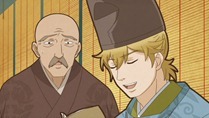
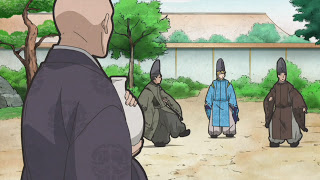
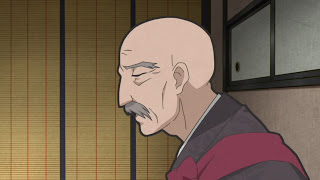
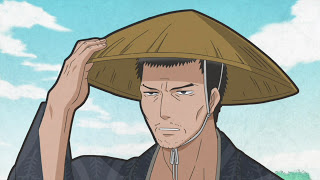


Ishruns
September 26, 2012 at 1:22 amI liked this series. May be not as much as other ones, but on a bland monday it kept me going. Thanks.
Woot for Chihaya though.
Helen
September 26, 2012 at 3:46 am"Outlaw poet"? How does that even work- "a kind of late-Heian Jack Kerouac who’s led many young men astray with his rogue poet/monk lifestyle" okay that would do it. Also, I thought I remembered reading that Chouyaku was actually an anthology of sorts, a different manga-ka did each story, although I could be wrong.
admin
September 26, 2012 at 4:41 amNope, it's all Sugita Kei.
elianthos
September 26, 2012 at 8:15 pm'Of course, however broken up he was about his unrequited love for Noriko, Teika recovered well enough to father 27 children by several different women. ' Ok, while I knew about this detail already something in the way you phrased it makes it irresistibly humourous.
—
Overall this turned out as a bit of a pet series to me even with all its limits, and I've looked forward to it every week. Also, Love Letter From Nanika has been stuck in my head since episode #1, to the point I don't realize I'm humming it until people in the street give me odd looks…
About this last episode: while it didn't reach the emotional peaks of some of the best episodes (compared to last week for instance) the 'goodbye sequence' here almost reached the brink of moving for me thanks to the princess' delivery.
The reflections on poetry at the very end were also good and basically saved the episode – and anime!Teika – for me. But then some of the series best moments were related to the role and function of poetry, thank goodness given the concept.
Then the ED song came and cheerfully destroyed the mood X,D. I was really hoping they wold skip it in the final episode or at least allow a bit more time for Teika's last words on poetry to linger. Alas.
Kim
September 27, 2012 at 3:46 amThis was my favorite summer series…although that isn't say too much since summer was pretty weak for me.
I could have definitely done without the modern comedy interludes as well, but overall I felt most of the stories were poignant and well told. It was also nice learning a bit more about the heian period (it's a bit neglected in anime).
And despite initially thinking every episode would focus on romantic love, I really enjoyed that the series demonstrated different types of love.
Finally bring on Chihayafuru!
Highway
September 27, 2012 at 2:27 pmOverall, I liked the series, even if it was often depressing. I appreciated the art style, and thought it didn't get in the way of the story too often. I just thought it was nice that they could take the known stories and the poems, and embellish them a little, and come up with a nice low-energy show to watch. I'm probably the last guy who should talk about poetry or the Heian period, cause I know very little about either, but I found the show engaging, if somewhat frustrating when compared with modern customs, and thought it was an interesting look at that stricter social structure.